In this article:
Bringing a new life into the world is a painful yet life-changing experience, something that most women look forward to.

However, this new and exciting chapter in a woman’s life can often be overshadowed by a thick, gloomy cloud of postnatal depression.
Ways to Deal With Postpartum Depression
Here are 10 things you can do to fight and prevent postpartum depression.
1. Up your vitamin D intake
Vitamin D is an essential nutrient that is important for mental health. This vitamin aids in the production of serotonin, the brain hormone associated with mood elevation and happiness. An adequate level of serotonin helps prevent and treat postpartum depression.
During pregnancy, with the demands placed on the body by the fetus, there is an increased risk for vitamin D deficiency.
Numerous studies in the last 5 years support that low vitamin D during pregnancy is a risk factor for developing postpartum depression. (1)(2)(3)
However, there was one study done in 2013 in which the findings did not support a link between low vitamin D during pregnancy and postpartum depression. Instead, this study revealed the opposite, that there was an increased risk for postpartum depression among women with the highest vitamin D levels. (4)
Vitamin D is acquired from exposure to sunlight, diet, and vitamin D supplements. Foods that contain vitamin D include some kinds of fish, egg yolks, and fortified dairy and grain products.
As there are relatively few dietary sources of vitamin D, most of the body’s vitamin D comes from direct exposure to sunlight. Vitamin D supplements are another common source of vitamin D. (5)
2. Eat foods rich in omega-3 fatty acids
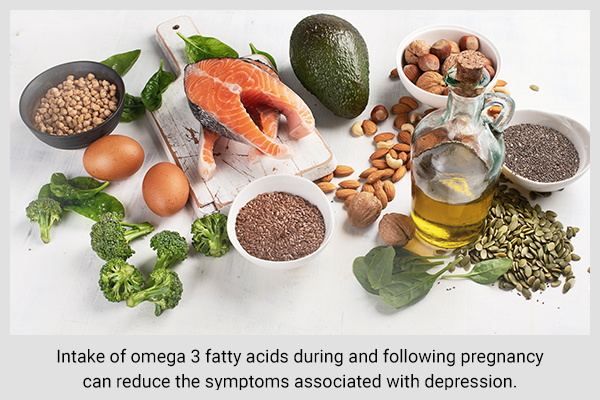
Omega-3 fatty acids are vital nutrients for a number of cell functions. These fatty acids are key components in cell membranes, which aid the proper functioning of serotonin. Serotonin is important for carrying messages to the brain cells to maintain a positive mood.
Omega-3 fatty acids also play a key role in the development and functioning of the central nervous system, and they have been proven effective in the treatment of perinatal depression, which includes depression both during and after pregnancy. (6)(7)
A review of literature in 2018 revealed strong evidence to support that dietary supplementation with omega-3 fatty acids during or following pregnancy can reduce the symptoms associated with depression. Furthermore, there is evidence that supplementation in healthy pregnant women reduces the risk of postpartum depression. (8)
To ensure an adequate intake of omega-3 fatty acids, eat more flaxseeds, fatty fish such as salmon, walnuts, and omega-3-fortified eggs. You can also take an omega-3 fatty acid supplement, after consulting your doctor.
3. Breastfeed your baby
New moms diagnosed with postpartum depression need a secure emotional attachment with their newborns. The infants also need this secure attachment with their mothers. This nonverbal emotional bond aids in releasing endorphins that make mothers feel happy and confident as a mom.
To build this strong emotional bond, breastfeeding is the best option. However, mothers with postpartum depression may be less likely to breastfeed.
This is supported by a 2012 study that revealed that there seems to be a reciprocal relationship between postpartum depression and breastfeeding; women who breastfeed are less likely to develop postpartum depression, while women with postpartum depression are less likely to continue breastfeeding. (9)
So, it becomes important for the partner or other family members to help new moms understand the importance of breastfeeding.
A study in 2018 showed statistically significant evidence that women who breastfeed their infant are less likely to develop postpartum depression. Further, this study suggested that even women who intended and planned to breastfeed but ultimately did not may be at a lower risk for postpartum depression. (10)
4. Consider talk therapy
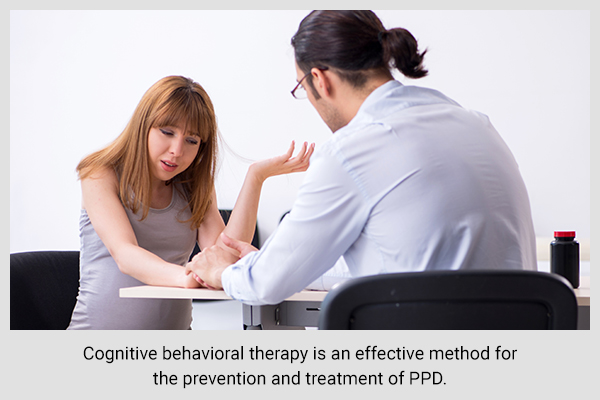
In talk therapy, a mental health professional (a counselor, therapist, psychologist, psychiatrist, or social worker) talks with the woman suffering from postpartum depression on a one-to-one basis.
This allows the new mom to share all her fears and emotions in confidence with someone outside her circle of family and friends. Through the therapy, the new mother becomes ready to accept the new responsibility of motherhood in a much better way.
Two types of counseling are found to be very effective in treating postpartum depression. These are cognitive behavioral therapy (CBT) and interpersonal therapy (IPT).
CBT helps people recognize and change negative thoughts and behaviors. This talk therapy is based on the premise that both perceptions and behaviors are intimately linked to mood. Evidence suggests that antenatal CBT is an effective method for the prevention and treatment of postpartum depression. (11)
IPT helps people understand and work through problematic personal relationships. This time-limited therapy focuses mainly on addressing the person’s interpersonal connections.
A 2007 study suggested that IPT can be beneficial in treating postpartum depression because it helps address interpersonal stressors that occur during the postpartum period. (12)
In both these therapies, treatment usually lasts 3 to 4 months.
5. Relieve your stress with a massage
A soothing, warm massage is one of the best ways to pamper a depressed body.
Massage not only rejuvenates a depressed body but also fills it with renewed energy, which is important as, being a mother, you have a new responsibility of taking care of your newborn baby.
It even helps get rid of all the negative feelings and thoughts, as well as plays a key role in managing physical pain and the impacts of stress.
Postpartum massage has other benefits too, including hormone regulation, reduced swelling, better sleep, and improved breastfeeding.
Along with that, doing a baby massage under the supervision of your partner or an expert can also help fight postpartum depression. Massaging the baby helps depressed mothers bond with their newborns.
There is evidence to suggest that massage during pregnancy benefits not only the mother, including reduced incidence of depression and lower cortisol levels during the postpartum period, but benefits the infant as well.
A study found that infants born to mothers who had massage therapy during pregnancy were less likely to be born prematurely and had a lower incidence of low birth weight. Those infants also had lower cortisol levels, like their mothers, and they performed better on orientation and motor scales. (13)
A study published in the Journal of Affective Disorders indicates that attending baby massage classes improved maternal depression and mother-infant interactions during the first year.
It is important to find a massage therapist who is certified in post-delivery massage therapy.
ALSO READ: 9 Relaxation Techniques to Reduce Stress
6. Try acupuncture therapy
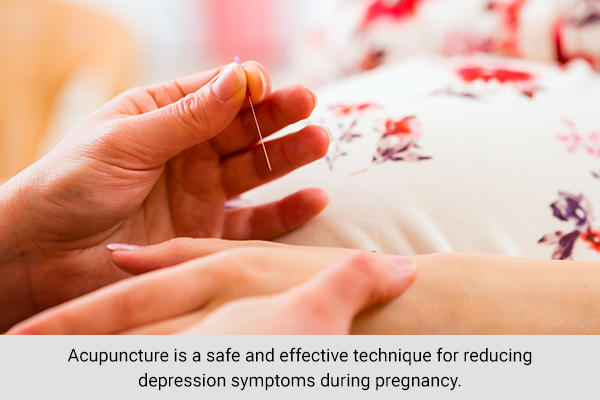
Another significant way to deal with depression post-delivery is age-old acupuncture therapy. In this therapy, thin needles are inserted at specific vital pressure points in the body.
It helps maintain the equilibrium of the various hormones in the body. Acupuncture is also beneficial during pregnancy. (14)(15)
Acupuncture is an effective treatment that can help to reduce depression symptoms during pregnancy. It can even give the mother a boost of energy to replenish the energy depleted during childbirth. (14)
When it comes to acupressure, it is important to get it done by an expert only.
7. Go for bright light therapy
The use of bright light therapy as a treatment for depression has become popular in recent times.
Bright light therapy has fewer side effects and is less expensive than antidepressant medications. The antidepressant effects of bright light therapy are well established, and it is a relatively safe treatment for depressive disorders. (16)(17)
In this therapy, the patient’s eyes are exposed to intense but safe amounts of light for a specific and regular length of time. The light corrects a problem with the inner biological clock, called the circadian rhythm.
Also, it affects neurotransmitters in the brain, including serotonin, noradrenalin, and dopamine, which are important in treating depression. Studies have shown that bright light therapy can improve the regulation of the serotonergic system in women with perinatal depression. (17)
Two cases highlighted in a letter to the editor of the American Journal of Psychiatry in 2000 showed a good clinical response to bright light therapy along with subjective reports of improvement in mood. The therapy was well tolerated in both cases with no adverse effects during the treatment course. (16)
8. Practice mindfulness meditation
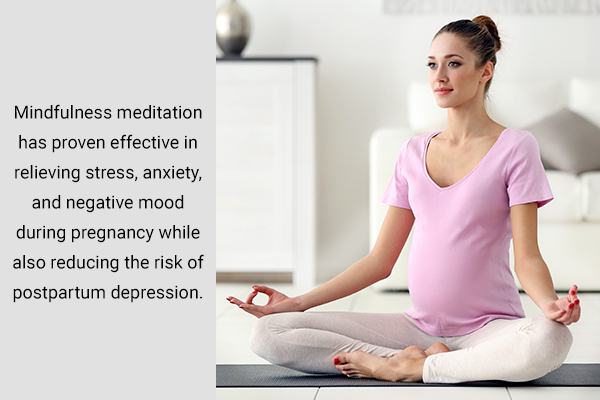
Mindfulness is defined as “the basic human ability to be fully present, aware of where we are and what we’re doing, and not overly reactive or overwhelmed by what’s going on around us.” (18)
It is a concept of Buddhist philosophy and is practiced to achieve enduring happiness and gain the appreciation of the true nature of existence. (19)
The practice of mindfulness meditation has been proven to effectively reduce stress, anxiety, and negative mood during pregnancy, thus lowering the risk of developing postpartum depression. (20)(21)
Mindfulness training has also been shown to be effective during childbirth and is used by some women as an alternative to systemic opioid pain medication. (22)
In fact, mindfulness meditation can make you feel calm and energized. These factors are needed for the new role of parenthood.
The practice of mindfulness-based childbirth and parenting (MBCP) results in a lower incidence of anxiety, depression, and negative affect during pregnancy, childbirth, and the early parenting period. (23)
Initially, make it a daily habit of spending at least 5 minutes intentionally practicing deep relaxation. Then, gradually increase the time.
9. Take proper sleep and rest
Altered sleep patterns and sleep disturbance are common during the postpartum period. These are related to newborn sleep and feeding patterns.
The Wisconsin Maternity Leave and Health Project indicated that sleep is highly essential for a new mom. A full 8 hours may seem impossible when you’re dealing with a newborn, but poor sleep makes depression worse.
Poor sleep leads to significant alterations in brain neurotransmitter functioning, which is one of the reasons behind depression.
A study done in 2001 revealed that difficulty falling asleep in the first month postpartum was one of the four predictors of depression at 4 months postpartum. The other predictors included maternal age, depression during pregnancy, and thoughts of death and dying at 1 month postpartum. (24)
During pregnancy and the postpartum period, it is important to catch up on lost sleep with naps. If possible, a new mother should take the baby out for a walk every morning to improve the maternal and child circadian rhythms. You can also ask your partner to help with the nighttime work.
10. Engage in mild exercises
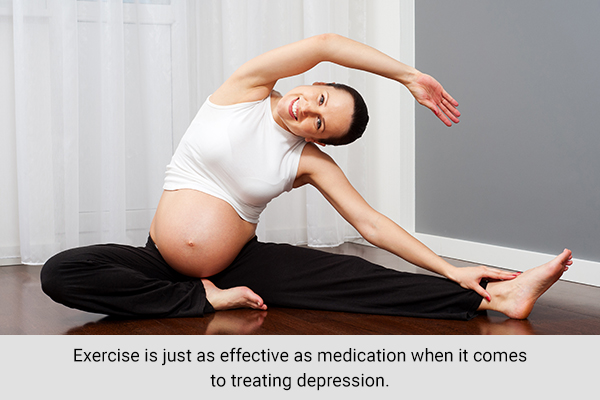
Exercise is just as effective as medication when it comes to treating depression. Hence, after delivery, the sooner you get back up and moving, the better. Numerous studies have shown that exercise is associated with decreased symptoms of anxiety and depression. (25)
There is no need to indulge in intense workout programs. Just a 30-minute walk each day will work wonders. You can also take your baby along in a stroller. Stretching yoga exercises are also helpful in getting you back in shape.
A 2007 review of the literature found evidence that supports exercise as a useful treatment for postpartum depression. (26) It is further suggested that taking a walk while pushing the baby in a stroller may be beneficial in the treatment and prevention of postpartum depression. (26)(27)
A 2018 study revealed that aquatic exercise can reduce the risk of developing postpartum depression. It was also suggested that obesity and a sedentary lifestyle during pregnancy are associated with positive screening for postpartum depression. (28)
Another 2012 study published in BMC Pregnancy and Childbirth also highlights the effectiveness of a 6-month exercise program as an effective treatment for postpartum depression. Exercise should be considered as part of a comprehensive treatment program for mothers who are at risk for or who have been diagnosed with postpartum depression. (29)
Additional Tips to Cope With Postpartum Depression
- Learn to bond with your baby. The more emotional connection you have with your baby, the lesser will be the chance of getting depressed.
- Motherhood is not an easy job. Do not hesitate to lean on others for help and support.
- Make your relationships a priority. During difficult times, strong relationships will help you get through the situation.
- Don’t keep your feelings to yourself. Share what you’re experiencing – the good, the bad, and the ugly – with your partner or anyone else with whom you feel comfortable.
- Make yourself and your baby the priority and do not worry much about household chores.
- To avoid postpartum depression, make time to take care of yourself. The more you care for your mental and physical well-being, the better you’ll feel.
- Make meals a priority and be sure to follow a well-balanced diet.
- Make time for your relationship with your partner.
- Keep the lines of communication open, especially with your life partner.
- Listen to a variety of music.
- Keep a journal to express your thoughts and feelings by writing them out.
- In severe cases of postpartum depression, antidepressants may be an option. However, medication should be taken only under the guidance of a physician.
Final Word
When you take on the role of a mother, the responsibilities that come with it can be quite daunting and overwhelming, especially in the initial phase.
Postpartum depression can further cripple new mothers by making them feel lonely, distressed, and anxious. It is the duty of friends and family to rally around the patient and help her through the bad times. But since the condition of the mother will inadvertently affect the baby as well, it is important to seek medical help to get the best possible treatment.
Trust your healthcare provider to show you the way through this difficult phase. Early treatment will help safeguard not just your own health but your baby’s well-being as well.
 Continue ReadingPostpartum Depression: Causes, Symptoms, and Treatment
Continue ReadingPostpartum Depression: Causes, Symptoms, and Treatment
- Was this article helpful?
- YES, THANKS!NOT REALLY


